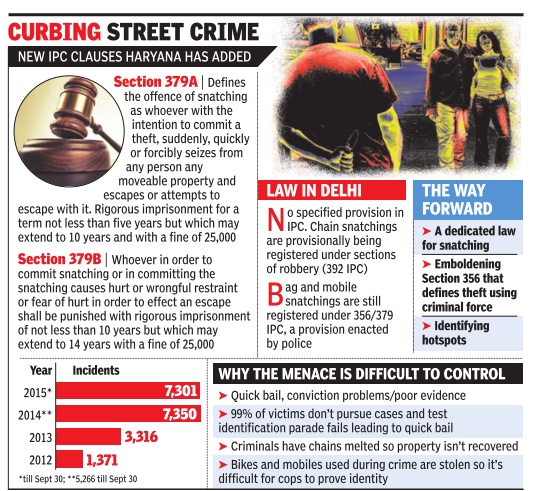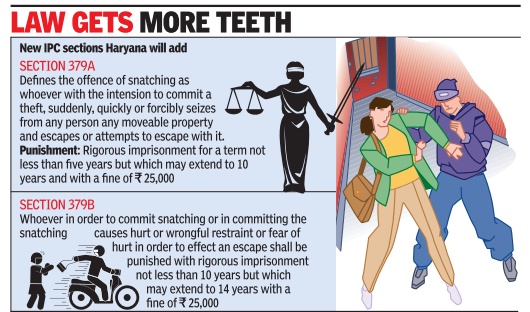Indian Penal Code: Theft
(→2001-17: Haryana more successful than, say, Delhi) |
(→Haryana adds clauses 379A and 379B (snatching)) |
||
| Line 181: | Line 181: | ||
Whoever commits theft shall be punished with imprisonment of either description for a term which may extend to three years, or with fine, or with both | Whoever commits theft shall be punished with imprisonment of either description for a term which may extend to three years, or with fine, or with both | ||
| − | =Haryana adds clauses 379A and 379B (snatching)= | + | =Snatching: making it a non-bailable crime, with 10 years' RI= |
| + | ==Haryana adds clauses 379A and 379B (snatching)== | ||
[http://epaperbeta.timesofindia.com/Article.aspx?eid=31808&articlexml=10-yrs-RI-for-snatchers-in-Haryana-19102015006024 ''The Times of India''], Oct 19 2015 | [http://epaperbeta.timesofindia.com/Article.aspx?eid=31808&articlexml=10-yrs-RI-for-snatchers-in-Haryana-19102015006024 ''The Times of India''], Oct 19 2015 | ||
Manvir Saini | Manvir Saini | ||
| + | |||
| + | |||
'''10 yrs' RI for snatchers in Haryana''' | '''10 yrs' RI for snatchers in Haryana''' | ||
| Line 191: | Line 194: | ||
Haryana has become the first Indian state to make snatching a crime that is punishable by a maximum of 10 years' rigorous imprisonment. | Haryana has become the first Indian state to make snatching a crime that is punishable by a maximum of 10 years' rigorous imprisonment. | ||
| + | |||
The state has got the President's approval to add two new clauses to Section 379 of the Indian Penal Code to strengthen the existing law.The new clauses have come into force from October 9. | The state has got the President's approval to add two new clauses to Section 379 of the Indian Penal Code to strengthen the existing law.The new clauses have come into force from October 9. | ||
Revision as of 10:39, 8 July 2018

This is a collection of articles archived for the excellence of their content. |

Contents |
Chapter XVII of the Indian Penal Code,1860
Offences Against Property
The relevant Sections of the IPC are
Section 378
Theft
Section 379
Punishment for theft
Section 380
Theft in dwelling house, etc.
Section 381
Theft by clerk or servant of property in possession of master
Section 382
Theft after preparation made for causing death, hurt or restraint in order to the committing of the theft
Section 383
Extortion
Section 384
Punishment for extortion
Section 385
Putting person in fear of injury in order to commit extortion
Section 386
Extortion by putting a person in fear of death or grievous hurt
Section 387
Putting person in fear of death or of grievous hurt, in order to commit extortion
Section 388
Extortion by threat of accusation of an offence punishable with death or imprisonment for life, etc.
Section 389
Putting person in fear of accusation of offence, in order to commit extortion
Section 390
Robbery
Section 391
Dacoity
Section 392
Punishment for robbery
Section 393
Attempt to commit robbery
Section 394
Voluntarily causing hurt in committing robbery
Section 395
Punishment for dacoity
Section 396
Dacoity with murder
Section 397
Robbery, or dacoity, with attempt to cause death or grievous hurt
Section 398
Attempt to commit robbery or dacoity when armed with deadly weapon
Section 399
Making preparation to commit dacoity
Section 400
Punishment for belonging to gang of dacoits
Section 401
Punishment for belonging to gang of thieves
Section 402
Assembling for purpose of committing dacoity
Section 403
Dishonest misappropriation of property
Section 404
Dishonest misappropriation of property possessed by deceased person at the time of his death
Section 405
Criminal breach of trust
Section 406
Punishment for criminal breach of trust
Section 407
Criminal breach of trust by carrier, etc.
Section 408
Criminal breach of trust by clerk or servant
Section 409
Criminal breach of trust by public servant, or by banker, merchant or agent
Section 410
Stolen Property
Section 411
Dishonestly receiving stolen property
Section 412
Dishonestly receiving property stolen in the commission of a dacoity
Section 413
Habitually dealing in stolen property
Section 414
Assisting in concealment of stolen property
Section 379- Punishment for theft
Whoever commits theft shall be punished with imprisonment of either description for a term which may extend to three years, or with fine, or with both
Snatching: making it a non-bailable crime, with 10 years' RI
Haryana adds clauses 379A and 379B (snatching)
The Times of India, Oct 19 2015
Manvir Saini
10 yrs' RI for snatchers in Haryana
State Adds Two New Clauses to IPC section, makes snatching a non-bailable offence
Haryana has become the first Indian state to make snatching a crime that is punishable by a maximum of 10 years' rigorous imprisonment.
The state has got the President's approval to add two new clauses to Section 379 of the Indian Penal Code to strengthen the existing law.The new clauses have come into force from October 9.
By adding clauses 379A and 379B, the state government has officially defined snatching as a non-bailable crime. Trial in snatching such cases now be conducted in sessions courts, instead of judicial magistrate courts.
Section 379 of the IPC (theft) carries a maximum punishment of three years, or a fine, or both. According to 379A (snatching), a convict will be punished with rigorous imprisonment for a term that is not less than five years but which may extend to 10 years, along with a fine of Rs 25,000. Section 379B (snatching and use of force) allows a convict to be punished with rigorous imprisonment not less than 10 years, which may extend to 14 years, with a fine of Rs 25,000.
There has been a rise in number of chain and pursesnatching cases in all main cities of Haryana, including Gurgaon and Faridabad.There have been cases where victims have been injured by criminals but police were not able to add harsher sections.Even sections related to robbery could not be added as it requires the presence of mo re than two criminals.
Till June 2015, 134 cases of snatching were repor ted from Gurgaon. Around 50% of cases, according to sources, have not been solved. The Haryana assembly had cleared the bill amending the law in July last year and was sent to the President for approval.
2001-17: Haryana more successful than, say, Delhi

See graphic, ‘Snatching cases in Delhi, 2001-17: and Haryana’s model'